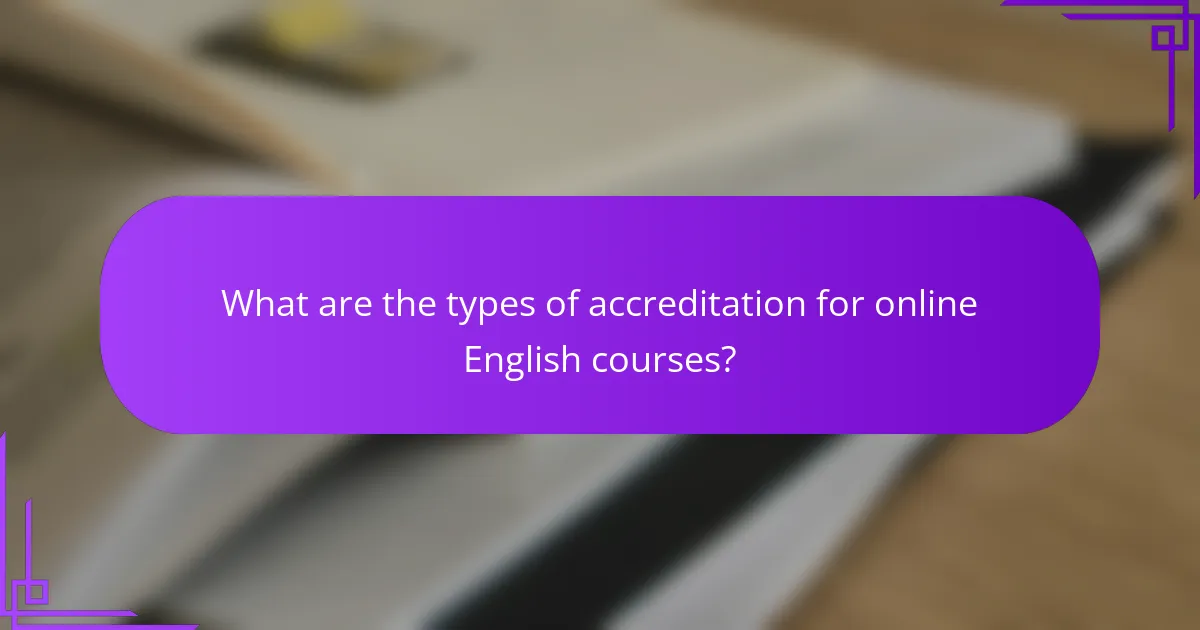Accreditation plays a vital role in online English learning courses by confirming that they adhere to established quality standards. This validation not only enhances the credibility of the education provided but also ensures that students are recognized by employers and other educational institutions, making informed decisions about their learning paths easier.

Why is accreditation important for online English learning courses?
Accreditation is crucial for online English learning courses as it verifies that the program meets established quality standards. This recognition ensures that students receive a credible education that is respected by employers and educational institutions.
Ensures quality education
Accreditation guarantees that an online English learning course adheres to specific educational standards, which typically include curriculum quality, instructor qualifications, and student support services. Accredited programs often undergo regular evaluations to maintain their status, ensuring continuous improvement and adherence to best practices.
For example, a course accredited by a recognized body may require instructors to hold advanced degrees in linguistics or education, enhancing the overall learning experience. Students can expect a structured curriculum that effectively covers essential language skills, from grammar to conversational proficiency.
Enhances credibility
Accredited online English learning courses carry more weight in the eyes of employers and academic institutions. This credibility stems from the rigorous evaluation process that accredited programs undergo, which assures stakeholders of the program’s quality and reliability.
When applying for jobs or further education, students can confidently present their accredited course credentials, knowing they reflect a recognized standard of excellence. This can be particularly advantageous in competitive job markets where language proficiency is a key requirement.
Increases student confidence
Knowing that their online English learning course is accredited can significantly boost students’ confidence in their education. This assurance allows learners to focus on their studies, knowing they are receiving a quality education that will be valued in the professional world.
Furthermore, students often feel more motivated to engage with the course material and participate actively when they trust the program’s legitimacy. This increased confidence can lead to better learning outcomes and a more fulfilling educational experience.

How does accreditation affect course selection?
Accreditation significantly influences course selection by ensuring that online English learning programs meet established quality standards. When a course is accredited, it indicates that the institution has undergone a rigorous evaluation process, which can help learners make informed choices about their education.
Guides informed decisions
Accreditation serves as a valuable tool for prospective students, guiding them toward quality programs that align with their educational goals. By choosing accredited courses, learners can be more confident that they will receive a comprehensive education that is recognized by employers and other educational institutions.
When evaluating options, students should consider the accreditation status of each program. Look for regional or national accreditation, as these are typically more respected and can impact the transferability of credits and the recognition of qualifications in the job market.
Identifies reputable institutions
Accreditation helps identify reputable institutions that adhere to high educational standards. Institutions that are accredited have demonstrated their commitment to providing quality education, which can enhance the credibility of the qualifications earned by students.
To ensure you are selecting a reputable institution, check if it is recognized by a relevant accrediting body. For example, in the United States, look for accreditation from organizations recognized by the U.S. Department of Education. This can help you avoid programs that may not deliver the promised educational value.

What are the types of accreditation for online English courses?
There are three primary types of accreditation for online English courses: regional, national, and programmatic. Each type serves a different purpose and can significantly impact the quality and recognition of the course you choose.
Regional accreditation
Regional accreditation is considered the gold standard in the United States for educational institutions. It is granted by one of six regional accrediting bodies and typically applies to colleges and universities, ensuring they meet high academic standards.
Courses from regionally accredited institutions are often more widely recognized by employers and other educational institutions. If you’re considering an online English course, check if it comes from a regionally accredited provider to enhance your credentials.
National accreditation
National accreditation is usually awarded to specific types of institutions, such as vocational schools and online colleges. While it can indicate that a program meets certain standards, it may not carry the same weight as regional accreditation.
Students should be cautious with nationally accredited programs, as some employers and universities may not recognize these credentials. Always verify the accreditation status and its implications for your future educational or career opportunities.
Programmatic accreditation
Programmatic accreditation focuses on specific programs or degrees within an institution rather than the institution as a whole. This type of accreditation is often granted by specialized organizations that assess the quality and effectiveness of particular educational offerings.
For online English courses, programmatic accreditation can demonstrate that the course meets industry standards. Look for courses accredited by recognized bodies in language education to ensure you receive a quality education that is respected in the field.

Which organizations provide accreditation for online English courses?
Accreditation for online English courses is typically granted by recognized organizations that evaluate educational programs against established standards. These organizations ensure that the courses meet specific quality criteria, which can enhance the credibility and value of the education provided.
Council for Accreditation of Educator Preparation (CAEP)
The Council for Accreditation of Educator Preparation (CAEP) focuses on accrediting educator preparation programs, including those that offer online English courses. CAEP evaluates programs based on their ability to produce effective educators who can meet the needs of diverse learners.
When considering CAEP-accredited programs, look for features such as comprehensive curriculum, qualified faculty, and robust assessment methods. Programs that meet CAEP standards often provide students with a solid foundation in pedagogy and practical teaching skills.
Accrediting Commission of Career Schools and Colleges (ACCSC)
The Accrediting Commission of Career Schools and Colleges (ACCSC) accredits institutions that offer career-oriented programs, including online English courses. ACCSC emphasizes the importance of preparing students for successful careers through relevant and practical education.
ACCSC-accredited programs typically focus on aligning their curricula with industry standards and ensuring that students gain applicable skills. When evaluating these programs, check for job placement rates and employer feedback, which can indicate the program’s effectiveness in preparing graduates for the workforce.

How can students verify the accreditation status of a course?
Students can verify the accreditation status of an online English learning course by checking official sources and consulting recognized accreditation databases. This process ensures that the course meets quality standards and is recognized by educational institutions and employers.
Check official websites
The first step in verifying accreditation is to visit the official website of the institution offering the course. Look for sections labeled “Accreditation” or “About Us,” where they typically list their accrediting bodies. Ensure that the accrediting organization is recognized by relevant educational authorities.
Additionally, check for any official seals or logos that indicate accreditation. These should link to the accrediting body’s website for further confirmation. If the information is not readily available, consider reaching out to the institution directly for clarification.
Consult accreditation databases
Accreditation databases are valuable resources for verifying the status of educational programs. Websites like the Council for Higher Education Accreditation (CHEA) or the U.S. Department of Education provide searchable databases of accredited institutions and programs. Use these tools to cross-check the accreditation claims made by the course provider.
When using these databases, pay attention to the type of accreditation listed—regional, national, or programmatic—as this can affect the recognition of your course. If you’re in Europe, similar resources like the European Quality Assurance Register for Higher Education (EQAR) can be helpful.

What are the benefits of choosing accredited online English courses?
Accredited online English courses offer several advantages, including the assurance of quality education, which can enhance your learning experience and future opportunities. These benefits include transferable credits, access to federal financial aid, and recognition by employers, making accredited programs a smart choice for students.
Transferable credits
One significant benefit of accredited online English courses is the ability to transfer credits to other institutions. If you decide to continue your education at a different college or university, accredited courses are more likely to be accepted, saving you time and money. Always check with the receiving institution to confirm their credit transfer policies.
To maximize your transferable credits, choose programs from well-known accrediting bodies. This can help ensure that your coursework aligns with the standards of other educational institutions, increasing the likelihood of credit acceptance.
Access to federal financial aid
Accredited online English courses qualify for federal financial aid, which can significantly reduce the cost of your education. This includes grants, loans, and work-study opportunities that are not available for non-accredited programs. To access these funds, you must complete the Free Application for Federal Student Aid (FAFSA).
When considering financial aid, ensure that the program you choose is accredited by a recognized agency. This will not only open doors to funding but also provide you with a more valuable educational experience.
Recognition by employers
Employers often prefer candidates who have completed accredited programs, as these courses typically meet established educational standards. Having an accredited qualification can enhance your resume and increase your chances of securing a job in a competitive market. Many employers view accreditation as a mark of credibility and quality.
To improve your employability, research the accreditation status of the programs you are considering. Look for programs that are recognized in your field, as this can make a significant difference when applying for jobs in English language teaching or related areas.

What challenges do unaccredited courses present?
Unaccredited courses can lead to significant challenges for learners, including a lack of recognition by employers and educational institutions. Without proper accreditation, the quality and credibility of the course content may also be questionable.
Limited Job Opportunities
Many employers prioritize candidates with degrees or certifications from accredited programs. Unaccredited courses may not meet industry standards, making it difficult for graduates to secure positions in competitive job markets.
For instance, a candidate with a certificate from an unaccredited online English course may find it challenging to compete against those with recognized qualifications. This can limit career advancement and earning potential.
Questionable Course Quality
The absence of accreditation often signals that a course may not adhere to established educational standards. This can result in subpar content, ineffective teaching methods, and inadequate support for students.
Students may invest time and money into a course that does not provide the necessary skills or knowledge, leading to frustration and wasted resources. It’s crucial to research the course’s curriculum and instructor qualifications before enrolling.
Lack of Transferable Credits
Unaccredited courses typically do not allow students to transfer credits to accredited institutions. This can be a significant drawback for those looking to further their education or pursue advanced degrees.
For example, if a student completes an unaccredited English course and later wishes to enroll in a degree program, they may have to retake courses, resulting in additional time and financial costs. Always check the transfer policies of prospective schools before choosing a course.


